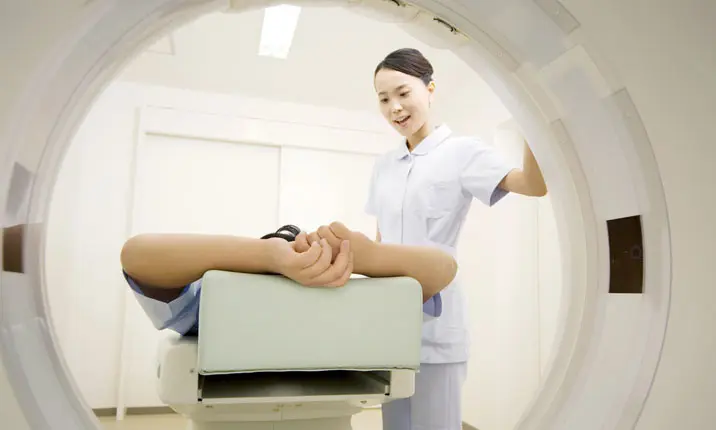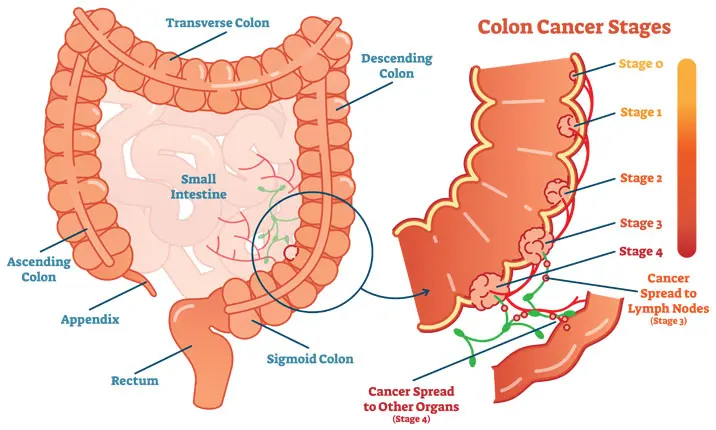Colon cancer occurs when abnormal cancerous cells develop in your intestines. Colon cancer, bowel cancer and rectal cancer are collectively known as colorectal cancer, and refer individually to the areas of the intestine tract they affect. But how is colon cancer detected?
Symptoms to watch out for
- Blood in your bowel movements
- Changes to your bowel movements, including persistent constipation or diarrhoea
- Cramping in your lower abdomen
- Often feeling like you urgently need to use the bathroom
- Pain in your pelvis
- Weight loss or changes to your usual eating habits
If you experience these symptoms, particularly in combination with each other, or any other significant changes to your bowel habits, you should visit your doctor immediately to be screened for colon cancer.
Do you need a colonoscopy?
Most people expect they will need a colonoscopy to confirm a colon cancer diagnosis. There are actually many diagnostic tools doctors can use to diagnose the condition. These include:
- Physical examinations, where the doctor feels your abdomen for abnormalities. They may also perform a digital (finger) rectal exam.
- Blood tests can detect a chemical known as carcinoembryonic antigen (CEA) which is produced by some colon cancers. This is not a very reliable test as some cancers do not produce this chemical, or do so only in very small amounts that may be hard to detect.
- A faecal occult blood test or an occult blood immunological (OBI) test can be performed on a sample of your stool, which will alert your doctor to the presence of blood that can’t be seen by the human eye. The faecal test cannot diagnose cancer, but will indicate the need for an urgent colonoscopy to exclude cancer.
- Flexible sigmoidoscopy, which is less invasive than a full colonoscopy, only examines the lower one-third of the large bowel (intestine). Your doctor will insert a flexible tube with a camera and a light into your rectum and bowel. They can then take images and a biopsy of cells for further testing. The procedure is very quick, but the drawback is that it can miss cancers in the upper parts of the colon.
- Colonoscopy, is the most accurate test to diagnose colorectal cancer. It is an examination of your entire large bowel. You’ll need to have bowel cleansing preparation beforehand and you will be given a sedative for comfort during the procedure. It usually takes up to half an hour and you can go home after the sedative wears off (usually 1 hour).
- CT colonography is an alternative to colonoscopy using CT (computerised x-ray) scans. Gas is used to inflate your bowel before a CT scan is carried out to reveal potentially cancerous sections of your colon. However, even if your doctor can do a CT colonography, you might still need a colonoscopy later on to confirm the diagnosis or remove cancerous cells.
Despite the various diagnostic tools, most of the time a biopsy from a sigmoidoscopy or colonoscopy is required to make an accurate diagnosis. Blood tests and occult blood tests can offer a strong indication of the presence of colon cancer, but it is not enough to make a diagnosis.
Treatment options
Most doctors will take a multi-faceted approach to cancer treatment. A combination of surgery, medication, chemotherapy and radiation therapy is often very effective.
- Surgery is the most common treatment for colon cancer. The type of surgery you have depends on the size of the cancerous masses and their positioning. Some small tumours can actually be removed by colonoscopy. However, most of the time your doctor will need to do a laparoscopy (keyhole) or open surgery to remove the cancer and the surrounding tissue. Your doctor will usually reconnect your bowel where a portion was removed, but in the rare case where this is not possible, you may need a colostomy bag. The bag sits outside your body and collects waste via a hole in your abdomen, until your surgeon is able to reconnect your bowel again. Unfortunately, in some cases a colostomy bag is permanent.
- Chemotherapy involves a lengthy treatment plan of very strong drugs to destroy cancerous cells. Because chemotherapy treatment is so intense, it has strong side effects and can make people feel ill during treatment.
- Radiation therapy involves directing powerful rays at the cancer cells to destroy remaining cells after surgery or to shrink a tumour before surgery.
- Immunotherapy is another approach that boosts your immune system to fight the cancerous cells.
Does treatment change at each stage?
Your treatment plan will depend on the stage the cancer is at when you are diagnosed. At stage I the cancer has not spread very far, and can usually be treated with surgery alone. At stage II and III, the cancer will have spread further into the surrounding area of the bowel and will require other therapies in conjunction with surgery to remove the cancerous cells. Stage IV cancer will have spread to other areas of your body and other organs, and will require vigorous treatment from all angles. Surgery alone will not be effective. It is for this reason that early detection is important in determining your treatment options and outlook.
Prevention and screening
As with all cancers, some people are more likely to get colon cancer than others. However, looking after your health, eating a fresh, balanced diet, cutting out alcohol and smoking and getting plenty of exercise will help to lower your risk. After the age of 45, your risk of colon cancer increases, so talk to your doctor about regular screening tests. If you notice any symptoms, visit your doctor immediately.














